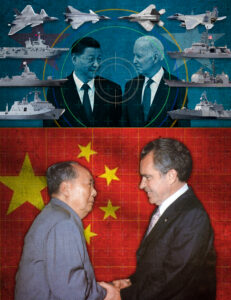
Illustration by Bob Millea
BY ED FELIEN
Secretary of State Blinken just got back from his visit with Xi Jinping and Chinese diplomats. He says the only issue dividing the two countries is that the U.S. wants closer military contacts to avoid a mistake that could lead to a catastrophe.
That sounds so sensible, so reasonable, such a peace-loving gesture.
That is probably not how the Chinese see the situation.
They see U.S. warplanes violating Chinese territory. They see U.S. destroyers invading Chinese waters. They consider these actions an attack on Chinese sovereignty.
They point to the Shanghai Communique of 1972:
“The U.S. side declared: The United States acknowledges that all Chinese on either side of the Taiwan Strait maintain there is but one China and that Taiwan is a part of China. The United States Government does not challenge that position. It reaffirms its interest in a peaceful settlement of the Taiwan question by the Chinese themselves. With this prospect in mind, it affirms the ultimate objective of the withdrawal of all U.S. forces and military installations from Taiwan. In the meantime, it will progressively reduce its forces and military installations on Taiwan as the tension in the area diminishes.”
The U.S. maintains the Taiwan Strait is international waters. The Chinese believe that the hundred miles of water between mainland China and Taiwan is part of the territory of China. They remind the U.S. of how John F. Kennedy forced nuclear missiles out of Cuba and restricted sea traffic in the 90-mile strait between Cuba and Florida, and no one except the Mafia was claiming that Cuba was part of the U.S..
More than 50 years ago in the Shanghai Communique the U.S. agreed to the “withdrawal of all U.S. forces and military installations from Taiwan.” This year Congress authorized a billion dollars’ worth of new weapons for Taiwan.
Why?
Why this sudden animosity to China?
Trade between the U.S. and China reached a record $690.6 billion in 2022. We imported $382.9 billion worth of goods and exported $307.7 billion. Nobody seriously wants to change that.
China has long encouraged Taiwan to invest in the motherland, and by the end of 2021 Taiwan businesses had invested $198.28 billion in mainland China. In 2021 trade between the two was $273.06 billion. Nobody seriously wants to disturb that.
So, why are there now these serious acts of provocation against China by the U.S.?
The recent round probably started with Nancy Pelosi’s trip to Taiwan. In an interview in The New Yorker in August of 2022, Shelley Rigger says, “The core thing that I take away from Pelosi’s visit is that it was ultimately about U.S. domestic politics and P.R.C. domestic politics, and Taiwan was the pawn caught in the middle. Initially, Pelosi’s goal was almost certainly to do a little cheerleading for Taiwan, show that the U.S. cares about it, that we’re paying attention, and that it’s an important friend and partner—that kind of thing. But, once it became this test of wills between Pelosi and her team and Xi Jinping and his team, whether or not it was good for Taiwan fell away, and it strictly became something that people in the U.S. and China were talking about, saying we had to do this because we cannot back down. And I think that’s very unfortunate. It does not benefit Taiwan, probably does harm to Taiwan’s security, and it has insured that U.S.-China relations, which were already pretty bad, are worse than they were before. We may have a much more difficult time recovering than we thought three weeks ago.”
Rigger concludes, “I don’t think the Pelosi visit, all of this brouhaha, is about Taiwan at all. It’s about American politicians thinking that this is the moment to poke Beijing or to stand up to Beijing or to prove how macho they are relative to Beijing. And, if Taiwan gets caught in the middle, well …”
Maybe it is about U.S. domestic politics, about election-year posturing. Maybe Biden is being tempted to use the Yellow Peril racist fear to win back some of the white males he lost to Trump in 2020.
There are already frequent acts of violence committed against Asians by white nationalist terrorists. Further provocation by the U.S. will encourage more of the same.
There is an opportunity here for Biden to do something truly historic. He could recognize the validity and the hopes of the Shanghai Communique. He could say Taiwan is a part of China, and we want to live in peace and harmony with all of the Chinese people.
The world is weary of war.
Tragically, there is a major industry that benefits handsomely from war and the threat of war. Our generals and admirals, our arms manufacturers, remind us that the price of liberty is eternal vigilance. Perhaps that’s true.
The people who wrote the Constitution understood that. They had just won a significant military victory over the leading imperialist world power. They appreciated the value of armed resistance. But they also feared the power of a standing army. They intended that there would be no standing army, and no appropriations for an army would be for more than two years.
Today, we spend $899 billion on defense. That’s more than the next 10 countries (including China and Russia) combined.
Buffy Sainte-Marie said it best in 1964, in a song that should be broadcast loud and clear to Russian soldiers in Ukraine and to U.S. pilots and sailors in the Taiwan Strait:
He’s the universal soldier and
he really is to blame
His orders come from far away no more
They come from him, and you, and me
and brothers can’t you see
this is not the way we put an end to war.






















